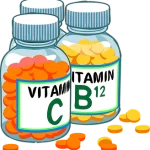As marvellous as they are, our bodies essentially require several vitamins and minerals for proper development and good health. And if you—like the rest of us—live a hectic, jam-packed life with not a lot of time on your hands, you might find it difficult to squeeze in your daily vitamin intake just through nutrition alone.
According to research conducted by the National Health and Nutrition Examination Survey (NHANES) from 2007 to 2010, there is a significant nutrient gap in the United States population with 61% of Americans not meeting their daily vitamin C intake, 56% for calcium, 48% for magnesium, 57% for vitamin A, 12% for vitamin E, and 6% for vitamin D. In the long run, vitamin deficiencies can culminate into other, more serious issues such as bone disorders, cardiovascular diseases, and skin problems.
One, promptly turns to supplements, but, can you rely on supplements alone as a replacement for food? The answer is in the meaning of the word itself. The word supplement means “something” which is added to “something else” in order to enhance its effects or make it whole. Although you can’t rely on nutritional supplements alone, they can be a great addition to a balanced diet.
The Benefits of Taking Nutritional Supplements
Meeting your basic micronutrient intake can be as easy as taking a multivitamin once a day. They come in the form of chewy vitamins, hard tablets, or liquids. Some multivitamins also claim to offer vitamin combinations especially designed for women, men, children, et cetera. It’s important to consult your physician or a nutritionist to decide which nutrient supplement is best suited for you. Paired with a well-balanced diet, a daily multivitamin supplement can be an excellent source of energy as well.
When you are on a weight loss program which includes 1,500 or fewer calories within your daily dietary allowance, you are probably missing out on some essential nutrients and food groups. This is where taking dietary supplements can fill in the gaps and make sure that your body is not vulnerable to deficiencies.

Types of Supplements
Nutritional supplements can range from protein shakes to gummy vitamins, and botanical oral drops to snack bars. Knowing about different types of dietary supplements which are out in the market is essential for maximising their nutritional potential.
Vitamins and Minerals
These types of supplements can range from vitamin C powders to daily multivitamin pills and iron tablets. If you feel groggy or know you are not incorporating enough vitamins and minerals in your diet, you might want to consider the benefits of throwing in a daily supplement. For instance, taking a daily iron supplement reduces the risk of developing anemia for people who don’t eat a lot of meat or green leafy vegetables like spinach and kale.
Fatty Acids
Your body needs essential fatty acids to function and perform day-to-day activities. You might be familiar with the importance of consuming omega-3 and omega-6 fatty acids if you have ever Googled anything nutrition-related. We usually acquire these fatty acids from foods like fish and nuts but like any other nutrient, we also sometimes fall short. Taking an omega-3 fatty acid supplement can lower the risk of heart disease, arthritis, and even depression. Omega-6 fatty acids are in charge of reducing the risk of developing cancer while lowering “bad” cholesterol levels. Meeting your daily intake requirement can be as simple as taking a fish oil supplement.
Herbal Supplements
Herbal supplements, otherwise known as botanicals, have been cultivated for their medicinal benefits for thousands of years. The Food and Drug Administration (FDA) classifies most herbal supplements as dietary additives rather than actual drugs. Many botanicals, such as lemon balm, even claim to assist with neurological conditions such as depression and anxiety. Be wary of any non-approved supplements, and make sure to consult a doctor before adding herbal supplements to your diet. They can have adverse effects when taken with prescription or over-the-counter medications.
Protein Supplements
If you have ever had a gym membership, then you are probably all too familiar with the whey vs plant protein discussion. Protein powders—such as whey, soy, and casein—are commonly used for muscle building and recovery, before and after workouts. Most protein powders or shakes are complete, which means that they contain all nine amino acid groups. This means that you don’t have to be a professional bodybuilder to reap the benefits of this macronutrient group. Whether it’s vegan or comes from an animal source, protein supplements together with high-protein foods can be great additions to an active lifestyle.

A Match Made in Heaven: Healthy Diet and Nutritional Supplements
A wholesome diet incorporating nutritional supplements and exercise can reduce the risk of disease, keep your energy levels high, and have you feeling amazing. Most of us do not get the right nutritional support we need, which is why taking daily supplements can have a positive impact on your health and wellbeing. The key is to choose supplements under professional supervision, and keep up a high nutritional standard within whatever you eat.








One Reply to “Supplements: Can They Replace Real Food?”
Comments are closed.